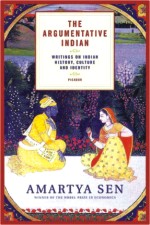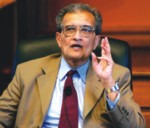
Inside
|
Arguing with Amartya Sen Yasmeen Murshed takes us on a fascinating journey through the mind of the Nobel laureate, one of the 21st century's finest and most thought-provoking social and moral philosophers
However, because he deals with serious questions of philosophy, sociology, politics, anthropology, faith, and religion, the book is weighty and requires the kind of intense concentration which is not easily achieved at the end of a long working day. In fact, let the reader be fore-warned that the book is definitely not bed-time reading, since it provokes serious thought and reaction! So, in order to fully appreciate it, I had to read and reread passages, sometimes many times, as well as lay the book aside and go to one of the myriad sources quoted in it to read the passage in question for myself. Thus, it is with much reading and cogitation (and occasional sleeping) that I am only now, after grappling with it for several months, nearing the end of the book. One has to be daring to comment on Professor Sen's writing, especially in his homeland, given his eminence and the admiring reviews by well-known writers and academics about his work. Professor Sen is unquestionably one of the most learned academics of our time. He is a Nobel prize winner for economics, a former Master of Trinity College, Cambridge, and now Lamont University Professor at Harvard -- therefore it is not surprising that the book has received fulsome reviews and approbation from his many admirers. As Professor Sen says, this book is a very serious effort to discuss "social and political understanding in India" and "as an involved Indian citizen, who is very concerned with Indian culture, history, and politics -- and also with general life in India" to show that "the classification of the cultures of the world has become cemented into a shape that pays little or no attention to a great deal of our past and present." It would take a number of articles to discuss the book in the kind of depth that it deserves, but I felt that one point that he makes may perhaps be extremely relevant for us in our present situation: hence this article. Sen says that: "Voice is a crucial component of the pursuit of social justice," therefore while voting and balloting serve to give popular choice an opportunity to manifest itself, in order for a robust democracy to flourish, "discussions and argument are critically important … The argumentative tradition, if used with deliberation and commitment, can also be extremely important in resisting social inequalities and removing poverty and deprivation." While an effective democracy demands much else, public reasoning, which is central to participatory governance, is an important part of a viable political system. Thus maintaining that public discussion and interactive reasoning are intimately connected to the functioning of democracy, he provides cogent arguments to reject the widely held belief that analytical reasoning and critique are essentially "Western" or "European" developments that have been introduced to the less advantaged countries by the colonists.
"In India," he writes, "heterodoxy has always been the natural state of affairs." He cites ancient texts and examples from early Indian history to show that a tradition of public discourse and discussion existed in India from ancient times, and that "the temptation to attribute the Indian commitment to democracy simply to the impact It is this point that Professor Sen makes which seems to me to be particularly relevant for our situation today. While there has been a definite attempt by civil society groups in the last few months to promote discussion and public debate on political choices, which have been made accessible to the general public by both the print and the electronic media, has it been enough? Now that we have numerous TV channels, there are quite a few talk shows and discussion programs to watch every evening. However I find that there is more or less an identical group of "talking heads" who show up on all these programs. I also find the same few dozen columnists whose views I read in the newspapers and have, in fact, been reading for the last decade. Have we not read it all, heard it all before? Do we not need to hear fresh voices that may have a different perspective from the narrow partisan views that can be predicted simply by the name of the channel one switches to or the paper that one is reading? Where is the general public? What do they have to say about the choices which are being offered to them. What is their view on governance? There is also apparently a very large group of young voters who will be eligible to cast their votes in the coming elections for the first time. I don't think we have heard enough from them. Professor Sen quotes an interesting comment made to him by a Bengali villager who was barely literate and certainly very poor, just before the Indian general elections in 2004. The man said: "It is not very hard to silence us, but that is not because we cannot speak." In fact as Professor Sen says elsewhere in the book: "Indians are naturally loquacious. We do like to speak." So do Bangladeshis, as many of us know, because we have been subjected to long, largely irrelevant comments by anyone who has been given control of a microphone on any occasion! Surely the voice of the people -- ordinary men and women whose prime interest is to go about their daily lives and achieve prosperity for themselves and their families -- should be heard on the important issues which concern just that peaceful pursuit. I wish we would give them a chance to share their views with us. Here I must quote Professor Sen once again because he says: "There is, however, a serious question to be asked as to whether the tradition of arguments and disputations has been confined to an exclusive part of the Indian population -- perhaps just to the members of the male elite. It would, of course, be hard to expect that argumentational participation would be uniformly distributed over all segments of the population, but India has had deep inequalities along the lines of gender, class, caste, and community. The social relevance of the argumentative tradition would be severely limited if disadvantaged sections were effectively barred from participation." Despite the fact that Bangladeshi society is fortunately largely free from caste divides, it seems to me that it is only the educated elite who are given the chance to air their views in print or on air. The tradition of public discussion and debate needs to be consciously developed to include all sections of society, regardless of class or gender, if we are to emulate the excellent example of India in establishing a healthy democracy that, despite the occasional hiccup, works most of the time. hiccup, works most of the time. The secret, of course, for establishmentarians is to resist the temptation to abandon "the priority of civilian rule -- no matter how inefficient and awkward (and how temptingly replaceable) democratic governance might have seemed." We are fortunate that our armed forces and all other institutionalized sources of power have rejected the option which Pakistan seems to slip into given the slightest excuse, thus effectively forcing democracy into a stop-start action and setting it back every time. Of course there are some comments made by Professor Sen with which I disagree, most notably his opinion that Islam greatly added to the richness of Indian civilization by encouraging greater debate and discussion. He maintains that there is a considerable history of the cultivation of public reasoning and of tolerance of heterodoxy in the Islamic world, too, and like other non-Muslim writers, he gives the example of the "tolerant multi-culturalism" of the Moghul emperor Akbar, specially citing his codification of minority rights and his belief that "the pursuit of reason rather than reliance on tradition was the best way to address difficult problems of social harmony, so laying the foundations for the secularism and non-denominational religious neutrality of the modern state." I find it very irritating that Akbar is so often held up as an example of the wise and tolerant ruler when, in my opinion, he was merely pragmatically desperate to consolidate his kingdom by any means possible. By most other accounts, he seems to have had, not surprisingly, given his lineage and upbringing, no strong religious beliefs, so to use him as an example of the tolerant Muslim ruler is specious at best. Certainly in the Prophet's lifetime and the early years following his death, Islam had a very strong tradition of open discussion and discourse on matters of faith as well as other more mundane affairs. However when the nomadic Arab tribes came bursting out of arid Arabia they came up against the institutionalized rigidity of practice and belief that characterized the Byzantine and Persian Empires. This put a stranglehold on the tradition of open public discourse and we have never recovered from that grip of death where matters of religion and faith are concerned. Would that we could question and argue freely without fear that the more orthodox would misunderstand the exercise, perhaps then there would be more tolerance and less "terror" in the Islamic world! I would like to end by sharing a rather amusing anecdote that I found in the book that struck quite a chord in my naturally contentious nature. Apparently Raja Ram Mohan Roy said in one of his poems, which unfortunately I have not read, explaining what is really dreadful about death: "Just consider how terrible the day of your death will be. Others will go on speaking, and you will not be able to argue back." Truly a depressing prospect! Yasmeen Murshed is Chairperson, Scholastica Group. To Rabindranath Shamsur Rahman People say poetry has fallen on hard times in Bangladesh. Sudhindra and Jibanananda are dead; Buddhadev seeks solace Like newly planted seedlings needing sun and rain As if in princely eminence -- when on midday Though the rose's sharp thorns pierced the azure of Rilke's being; You have given my days the glow of poetry You've emboldened me to walk the open road of symbols Translation: Fakrul Alam |

 He points out that a vast diversity of views and faiths and competing ideas has always co-existed in India, as in many other parts of the world. This has created an ancient and venerable tradition of public participation in decision-making, of government by discussion, and
He points out that a vast diversity of views and faiths and competing ideas has always co-existed in India, as in many other parts of the world. This has created an ancient and venerable tradition of public participation in decision-making, of government by discussion, and